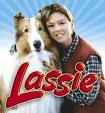Our bodies often send us pain signals that we just don’t understand.
Much like when we watch an episode of Lassie, all we really hear from an injured joint is barking. “What’s that, knee joint? My arch has fallen down a well and cant get out? Ok, lets go to the old johnsons place and get a rope!”

When Lassie barks, people listen.
Wouldn’t it be great if were were able to sit down and have a nice cup of tea with the ankle, knee and hip and ask them what is really going on? Who caused this and what other instigators are involved? What would they tell us? What if we included some other major players into the conversation like the low back or the shoulders? Some might just show up and have nothing to say but be happy for the free tea… but some might tell us things we wouldn’t have known unless we asked…
If we are to listen, watch and learn, we might actually understand better what is happening.
Let me give you an example of one of my clients. Her real name is Joan, but lets call her ‘Marion’ to preserve her identity 😉
Marion says ‘my knee hurts’. I resist all instincts to immediately take out any exercise that might affect Marions knee, but first ask a few questions.
Turns out Marion wore high heels all this week (fashion diva that she is). Her knees now hurt. That information is crucial to me if I understand two things:
THE ANKLE IS A SHOCK ABSORBER:

Shock absorbers make for a softer ride
By placing her foot in a high heel she reduced the range of movement of the ankle significantly (at the price of a nice looking calf of course a small price to pay for beauty – I mean, they hobble women in China to give them pretty folded over feet, right?).
WALKING ON SUNSHINE

The four trapped youngsters failed to realize the jumping at once would fail to launch them free of the von trapp bouncy castle.
Each time you step, your ankles, knees and hips act together to absorb shock. Take away your ankles ability to bend and absorb shock, you increase the load on the hips and knees (someones gotta take the load, right?).
HIPPY HIPPY SHAKE
If you happen to be wearing high heels, your heels are lifted, which means your hips will likely tilt forward to help your lower back to arch forward and your mid back to lean back to preserve your center of gravity.
If that didnt make sense, just know that wearing high heels will create a chain reaction that tilts your hips forward. If you have ever worn high heels then I dont need to tell you that you are putting more pressure on your low back.
PHYSICAL THERAPY FASHION WEEK
If you have experienced this phenomenon, but are not sure that your local physical therapist/doctor understands how the ankles can connect to the hips, then I suggest you take a pair of heels down to their office and have your doctor/therapist walk around in them for a while – of course, if it is a male doctor/therapist they might need a larger size heel (and get it in black so it looks more businesslike around the office).

I'm not sure which aspect of this picture makes me feel more uncomfortable. The awkward posture from high heels or the vinyl leather outfit. Either way, it's just plain wrong.
The theory of a strong connection between knee pain and heels is because wearing them can place a whole extra load on the kneecaps.
Sound ridiculous? Hopefully not after you have read this post.
If you have experienced pain then I would urge you to see help from a professional that understands how to read your ‘body language’. Of my knowledge, the group that are best qualified to do that are the graduates of a special program – the GIFT program (put together by the GRAY institute, run by Gary Gray, a world renowned physical therapist and an amazing human being).
If you have ever been to see a physical therapist and found it a negative experience, I would beg of you to consider seeing a GIFT graduate. Having completed the course, I can tell you the finest quality of therapist (and highest quality people) attend these courses and are fully committed to helping others but also taking the time to understand them. In short, they “get it”.
What makes a GIFT graduate different than other professionals in the health professions? They GET IT!
These people represent some of the sharpest and most progressive minds in the country – and can sometimes be hard to find if you dont know what or who you are looking for. I am just lucky enough to know some of them.
These fine people are known as GIFT Graduates – they will likely also be qualified as “Functional Manual Release” Therapists (one of the certifications offered within the course).
These graduates will also have a secret handshake that they use to connect with other GIFT graduates. Just kidding, they don’t (or do they?…..)
If you are a physical therapist looking for more information on the GIFT program and why it breeds the sharpest functionally aware physical therapists and personal trainers in this country, you can click here:
http://www.grayinstitute.com/about.aspx
To find a GIFT graduate in your area who can help you, use the email below:
info@grayinstitute.com
Best of health to you all,
Jamie Atlas







